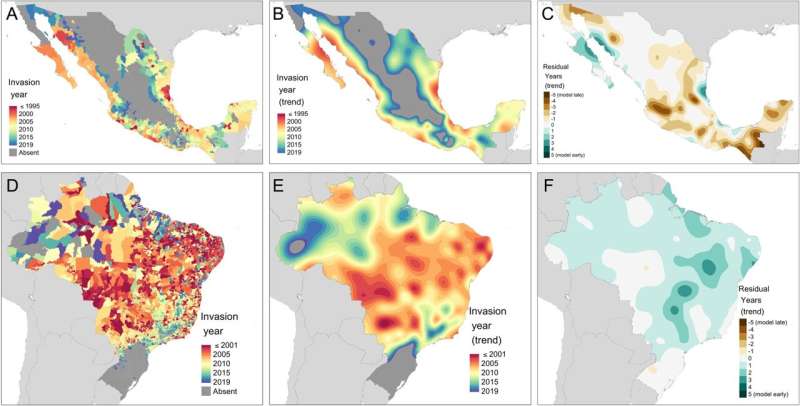Brazil and Mexico may be affected by a much greater spread of dengue in the years to come, according to a new study from the University of Toronto’s Temerty Faculty of Medicine.
The research, published in Nature Communications, used geospatial machine learning models to map out the future spread of dengue in the two countries until 2039 using data related to regional environmental factors as well as historical data on human population mobility.
The model predicted that the percentage of municipalities affected by dengue will rise from 76 to 97% in Brazil and from 55 to 91% in Mexico, which the study notes is “a more extensive and rapid expansion” than previously thought.
“COVID-19 has brought emerging infectious diseases to the forefront of public discussion. The pandemic is a reminder of the profound harm emerging infectious diseases have on health systems,” says the study’s first author Vinyas Harish, an MD/Ph.D. student at Temerty, post-graduate affiliate at the Vector Institute for Artificial Intelligence and clinical clerk at Unity Health Toronto.

Dengue is a viral infection, spread to humans by mosquitoes, that affects 100 to 400 million people each year in tropical and subtropical climates.
While some people experience mild symptoms, for others, dengue can lead to much more serious outcomes like hospitalization or death. No specific treatment for dengue exists, says the World Health Organization, and there was a global spike in cases in 2023, which led to international concern about the surging numbers.
For the study, researchers—who included Professor Kamran Khan and Associate Professor Isaac Bogoch from Temerty’s department of medicine—developed and validated their models by looking at more than 8,000 municipalities in Brazil and Mexico over 25 years. They also integrated insights from historical outbreak records, climate change projections and evolutionary history of viral genetic sequences.
The researchers say they believe it’s the first time, to their knowledge, “that spatial models of disease spread have informed origins, pathways and future projections of an emerging infectious disease.”
The paper—led by Oliver Brady of the London School of Hygiene and Tropical Medicine—involved researchers from Canada, the United States, Australia, England, Brazil and Mexico.
Researchers say they hope the findings of the paper help with understanding other emerging infectious diseases, and the best ways of combating the spread of dengue in the future.
More information:
Vinyas Harish et al, Human movement and environmental barriers shape the emergence of dengue, Nature Communications (2024). DOI: 10.1038/s41467-024-48465-0
Citation:
New study predicts worsening dengue spread in Mexico and Brazil (2024, June 10)
retrieved 10 June 2024
from https://medicalxpress.com/news/2024-06-worsening-dengue-mexico-brazil.html
This document is subject to copyright. Apart from any fair dealing for the purpose of private study or research, no
part may be reproduced without the written permission. The content is provided for information purposes only.

